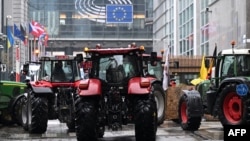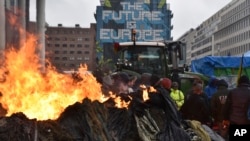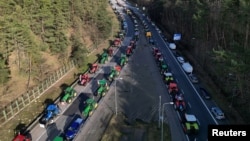Protesting farmers filled the streets of Brussels on Monday to rally against agricultural red tape and unfair competition from cheap imports, with many surrounding the European Council building, where EU ministers were meeting.
The protesters entered the city with 900 tractors, sprayed liquid manure and threw eggs and flares at officers, according to Brussels police. Many tractors were seen lining the roads leading to Brussel’s European quarter, blocking traffic and public transportation.
Officers responded by deploying tear gas and spraying water cannons at protesters.
The rally in Brussels was one of several protest actions occurring throughout Europe. Farmers have also staged similar protests in Spain, Germany and Poland.
On Monday, farmers blocked a border crossing between Poland and Germany, and in Madrid, staged a demonstration against changes to subsidy programs, among other related items.
Farmers are upset by what they see as red tape surrounding agricultural policies and unfair competition from other countries’ cheap imports that don’t have to follow EU regulations.
According to Marieke Van De Vivere, a farmer from northern Belgium who spoke with The Associated Press, farmers are “getting ignored.” She added that she invited the ministers “to be reasonable to us, to come with us on a day to work on the field, or with the horses or with the animals, to see that it is not very easy … because of the rules they put on us.”
Other farmers expressed similar sentiments, demanding that the EU make concessions, Reuters reported.
Morgan Ody, general coordinator of the farming organization La Via Campesina, said, “We’re here again in Brussels today as farmers because the European Union is not listening to our demands. Our demands are for fair revenue.”
She added, “We produce the food, and we don’t make a living. Why is that? Because of free trade agreements. Because of deregulation. Because the prices are below the cost of production. So, we demand the EU to move on this.”
The use of force by some protesters has been condemned by some officials. After protesting farmers broke through police barricades surrounding the European Council building Monday, causing police officers to scatter, Belgian Interior Minister Annelies Verlinden urged officers to identify “rioters.”
Verlinden said on the X platform, “The right to protest is dear to us so it must be used with respect.”
Similar shows of force have occurred at recent protests. Earlier this month in Brussels, flaming hay bales, eggs and firecrackers were thrown at police near an EU summit.
The grievances expressed by farmers throughout Europe are coming at an important time for officials, as Europe-wide elections are set to occur from June 6-9.
Although many farmers are still upset with agricultural policies, their efforts have yielded some results, and many officials have voiced support for their cause. While ministers met Monday in Brussels, some farmers were allowed in to speak.
The EU presidency, which Belgium currently holds, has acknowledged some grievances expressed by European farmers, particularly the burden of abiding by environmental policies, less subsidy assistance and the supply-chain impact of Russia’s invasion of Ukraine.
Agricultural ministers throughout Europe have expressed support for farmers at the talks Monday, The Associated Press reported.
Belgian Agricultural Minister David Clarinval said, “We understand that this situation is difficult,” adding, “It’s necessary to take rapid measures as well as measures in the longer term at the European level.”
Irish Agricultural Minister Charlie McConalogue stressed the importance of cutting agricultural red tape — which is at the core of what many farmers are protesting.
Further, in France, Agricultural Minister Marc Fesneau told reporters that “there’s a need to send signals immediately to tell farmers that something is changing, not only in the short term but also in the medium and long term.”
In recent weeks, the EU has modified its 2040 climate roadmap, removing goals to reduce farming emissions and pesticides.
Some information for this report came from The Associated Press and Reuters.







